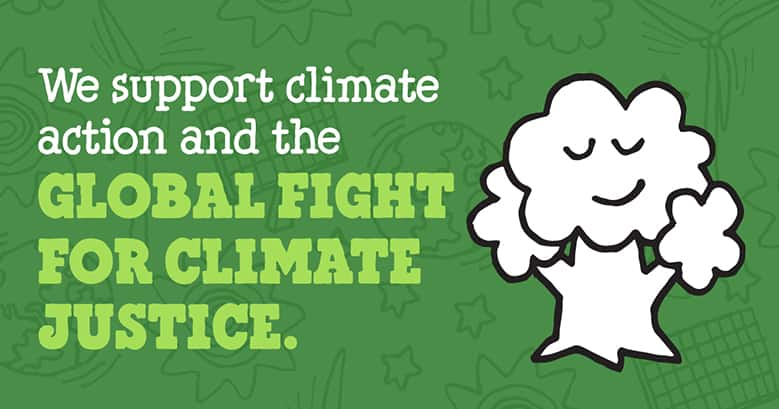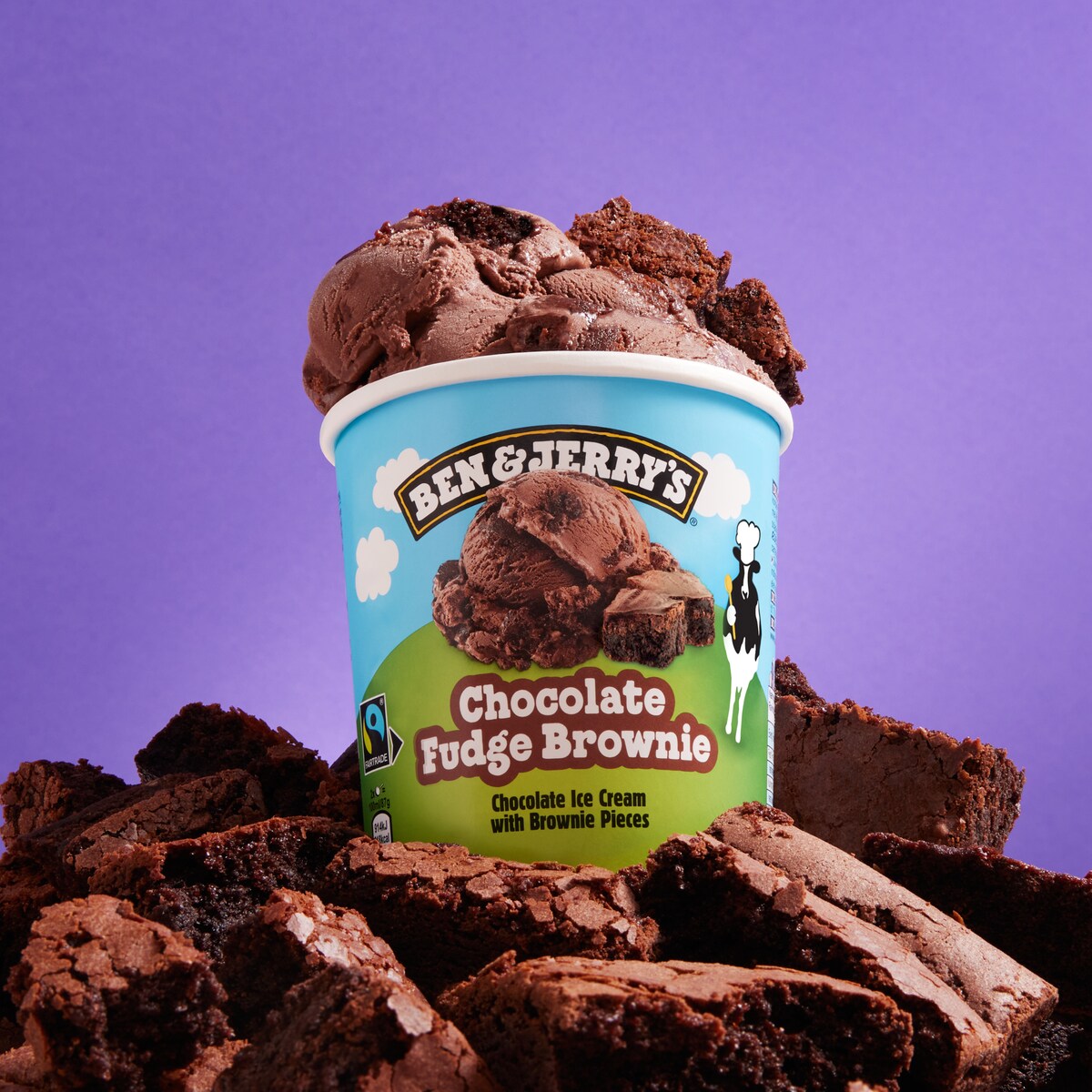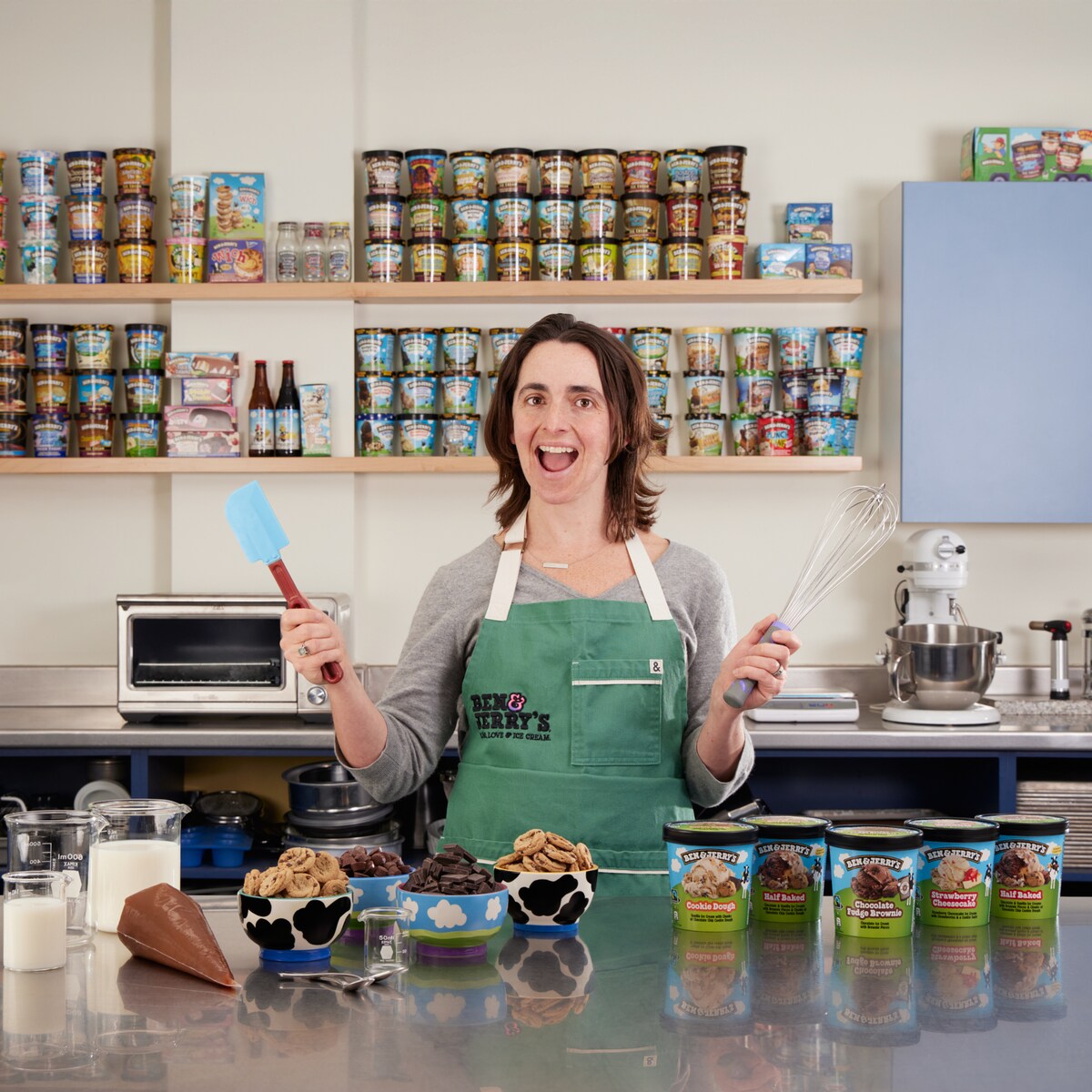
We prefer our ice cream like our polar ice caps: Unmelted. Unfortunately, though, the climate crisis has other plans. It’s already disrupting our planet and our lives in dramatic ways—and if we don’t act now, we might even lose some of our favorite ingredients, like cocoa, vanilla, and coffee! That’s why we’re working to make sure that we’re doing our fair share to avert the climate crisis.
At Ben & Jerry’s, we believe that we can cut greenhouse gas emissions from dairy by more than half over the next decade, while at the same time helping our farmers adopt agricultural practices that will help make their cows more healthy, their soil more productive, and our planet more resilient.
This fight is personal to us. Farmers are among those most vulnerable to the unpredictable and extreme weather generated by climate change—which is why we’re also working with those building a global climate justice movement to support them and all frontline communities. Here’s what we’ve been doing to help make a difference.
Dairy
Unsurprisingly, dairy is a key ingredient in our euphoric ice cream. Since dairy production accounts for more than 50% of our emissions, it’s where we have the greatest opportunity to reduce our carbon footprint. We’re partnering with experts on strategies that have the potential to make a huge difference:
Manure Digesters: Capturing climate-warming methane from manure and using it to generate renewable electricity.
Innovative Feeds: Cows naturally generate methane, a greenhouse gas—which is why we’re improving forage quality and piloting a new feed additive to reduce enteric emissions.
Regenerative Agricultural Practices: We’re working with the University of Vermont and Wageningen University to develop regenerative farming practices that improve soil health and productivity.
Growing Non-Dairy: Our Non-Dairy desserts have about half the carbon footprint as our dairy ice cream (though we’re trying to bring that down too), so we’re working to make Non-Dairy flavors a larger percentage of our total sales.
Manufacturing and Packaging
Reducing the impact dairy production has on the planet is key. But we’re always working on ways to reduce our manufacturing footprint as well.
We procure 39% renewable energy, including electricity and thermal energy, for our European manufacturing. Our main factory in Hellendoorn, the Netherlands, has been purchasing 100% wind power since 2011 and produces about 11% of its thermal energy from renewables via the “Chunkinator”—their on-site anaerobic digester. Hellendoorn has a strong decarbonization program in place using heat recovery and other projects and hopes to be fully decarbonized within the next few years.
In North America, the electricity we use is 100% from renewables, and we are making progress toward achieving our targets for further on-site thermal energy use. Our manufacturing team has been working hard to decarbonize our factories by implementing projects that reduce the demand for fuels and increase efficiency.
Once we’ve concocted your favorite flavors in our factory, the next step is packaging them and getting them to you! We’ll admit that we have some pretty ambitious packaging goals:
100% of our packaging to be free of petrochemical-based plastic.
All of our packaging to be reusable, compostable, or recyclable by 2025.
Back in 2019 we stopped using single-use plastic spoons and straws in our Scoop Shops worldwide, eliminating around 80,000 pounds of plastic waste every year. We’re committed to removing all petrochemical-based plastic from our consumer packaging. Meanwhile, the work continues to find plant-based and/or compostable alternatives to conventional petrochemical-based plastic and develop reusable packaging options.
Freezers
We helped to pioneer the technology for Cleaner Greener Freezers—climate-friendly, hydrocarbon (HC) freezers that don’t use climate-polluting HFCs (hydrofluorocarbons). Right now there are more than 60,000 HC freezers in use across the US.
HC freezers are more energy-efficient and use a natural hydrocarbon refrigerant with lower global warming potential than the HFC refrigerants commonly used in most US freezers. They’re also cheaper to run than standard freezers, so we’re really hoping that other companies will come to understand that helping save the environment is actually quite good for business too.
Fairtrade
While climate change affects all of us, it does not affect all of us equally. Marginalized and frontline communities all over the world have been hit hardest by the climate crisis. Smallholder farmers, in particular, are struggling to adapt to the unpredictable weather patterns and global market disruptions brought on by climate change. That’s a big reason why it’s so important to us that all our flavors are Fairtrade Certified.
That means that we support smallholder sugar, cocoa, vanilla, banana, and coffee farmers who receive an additional social premium on top of the purchase price of their crop. They can then use that social premium to improve their standard of living and help them build climate resilience into their operations. We also partnered with Fairtrade through our Producer Development Initiative Fund, providing additional funding and resources targeted at strengthening climate resilience through initiatives like agroforestry and irrigation, benefitting rural communities more broadly. In November 2020, we took it up a notch by committing to paying a higher price, on top of our existing Fairtrade premium, that will help cocoa farmers in the Ivory Coast achieve a living income.
The Struggle for Climate Justice
We’ve always sought, at every level of our business, to advance the causes of human rights and dignity, support social and economic justice for historically marginalised communities, and protect and restore the Earth's natural systems. It’s impossible to fight climate change without also fighting for justice. Can ice cream help save the world? We think so. For years we’ve been using our company and its power and privilege to support activists fighting for climate justice.
But there’s more work to be done. Together we can all be part of the global climate movement that’s calling on world leaders to enact policies that keep fossil fuels in the ground and speed the transition to a sustainable and just tomorrow. Join us!
???bjint_gigyaForm.modal.headerText.default???
???bjint_gigyaForm.modal.subHeaderText.default???
Recent Articles


